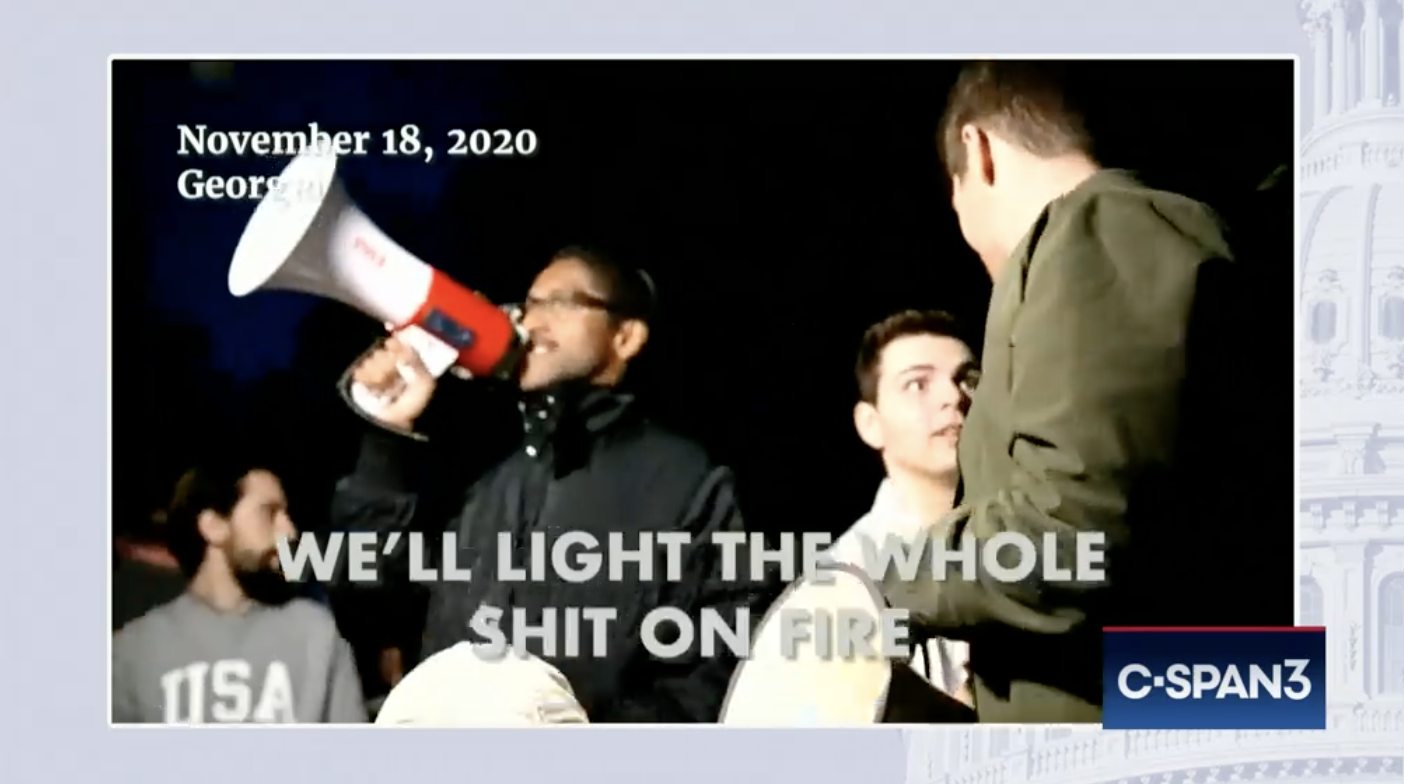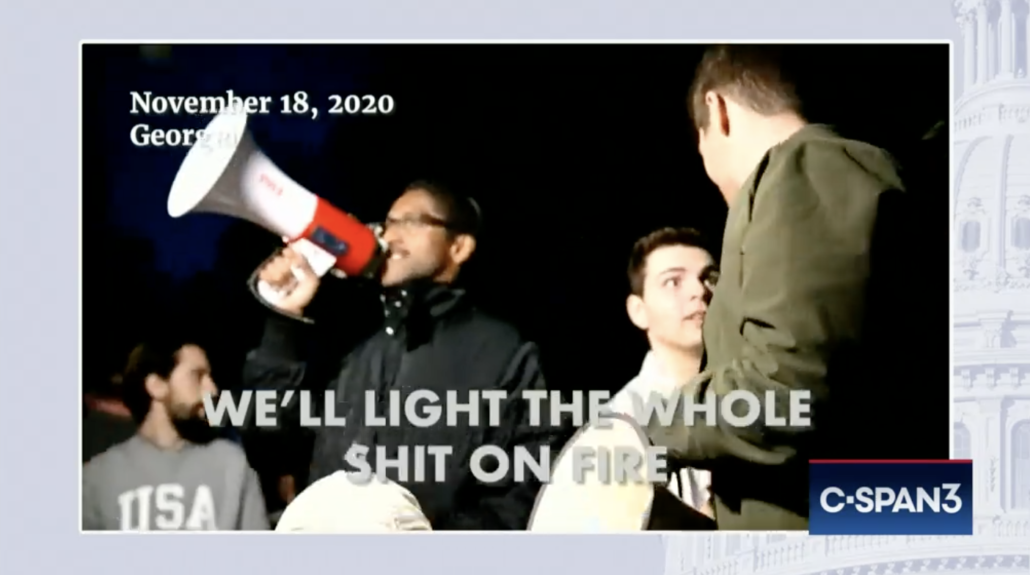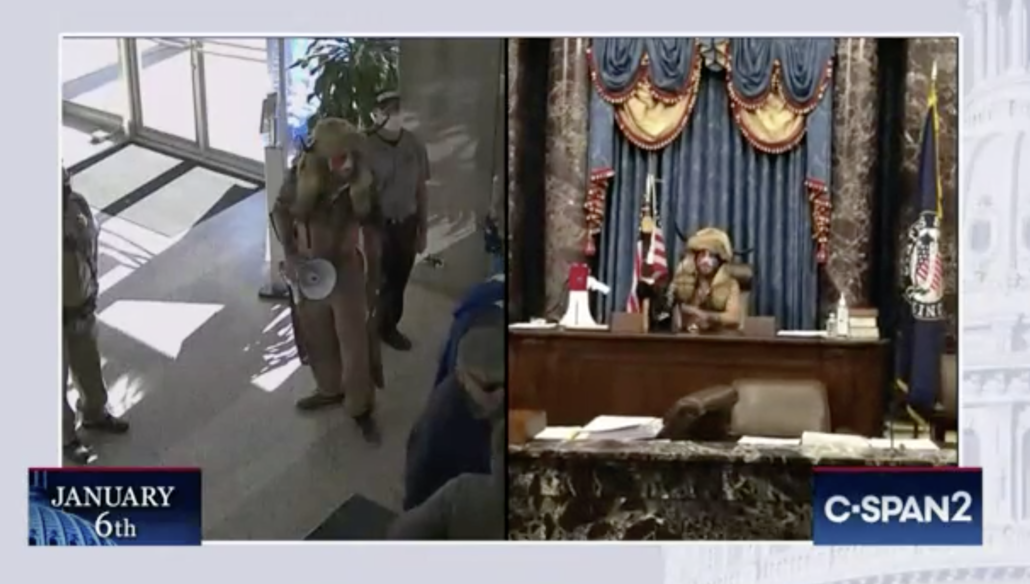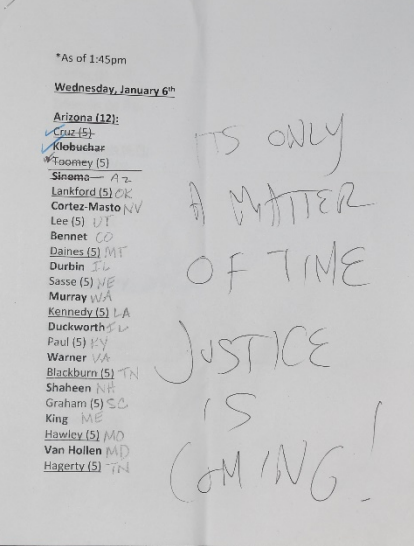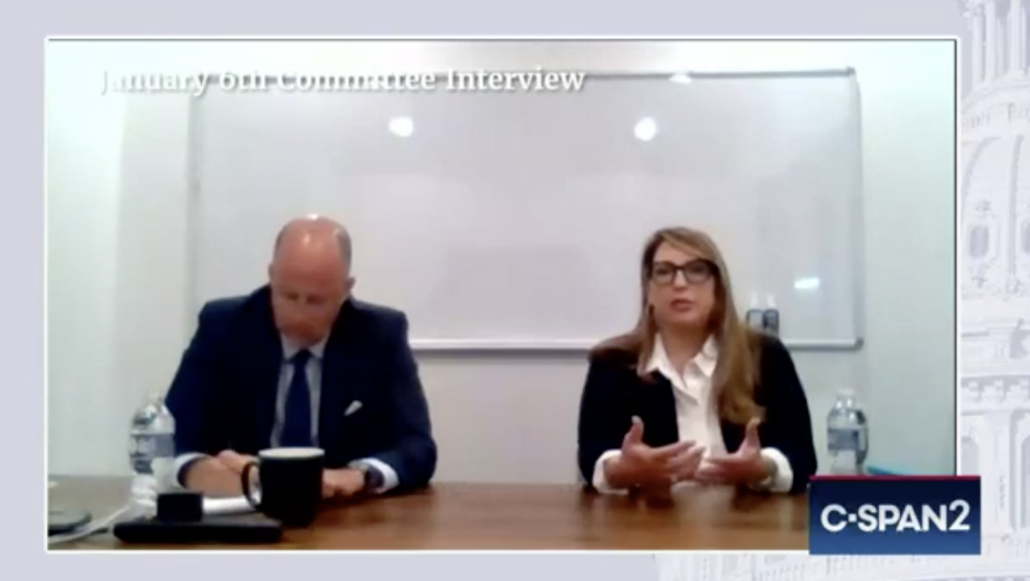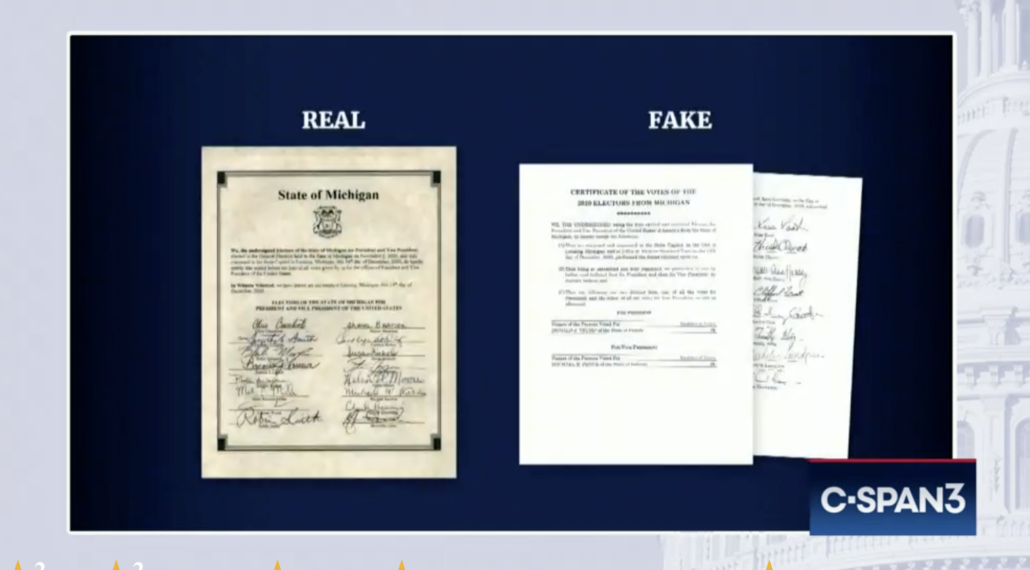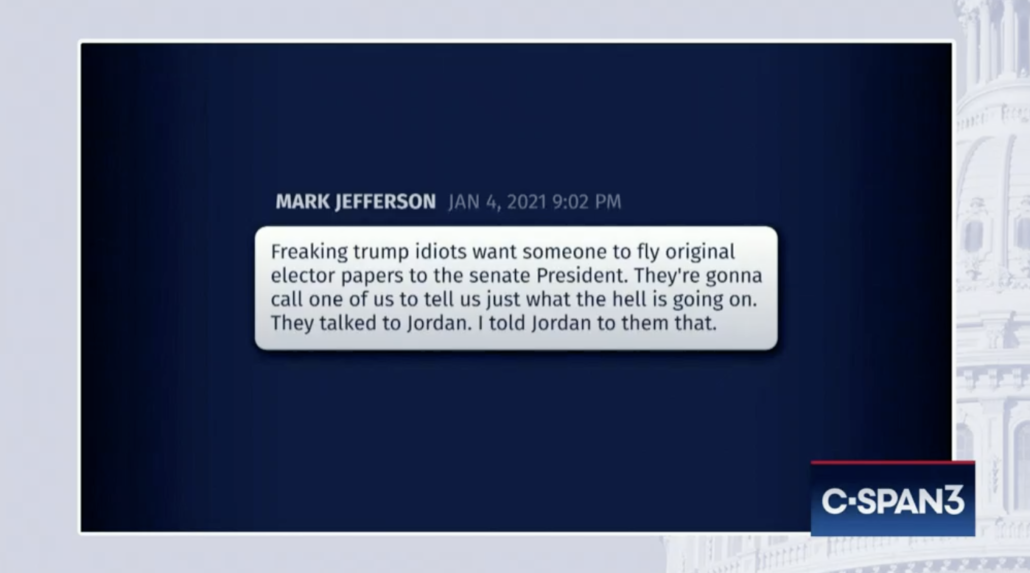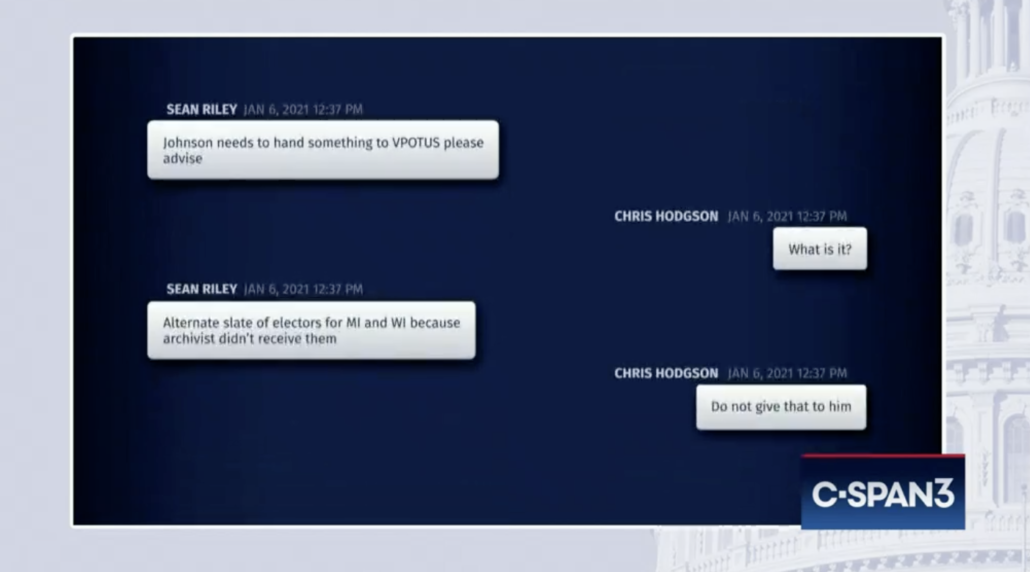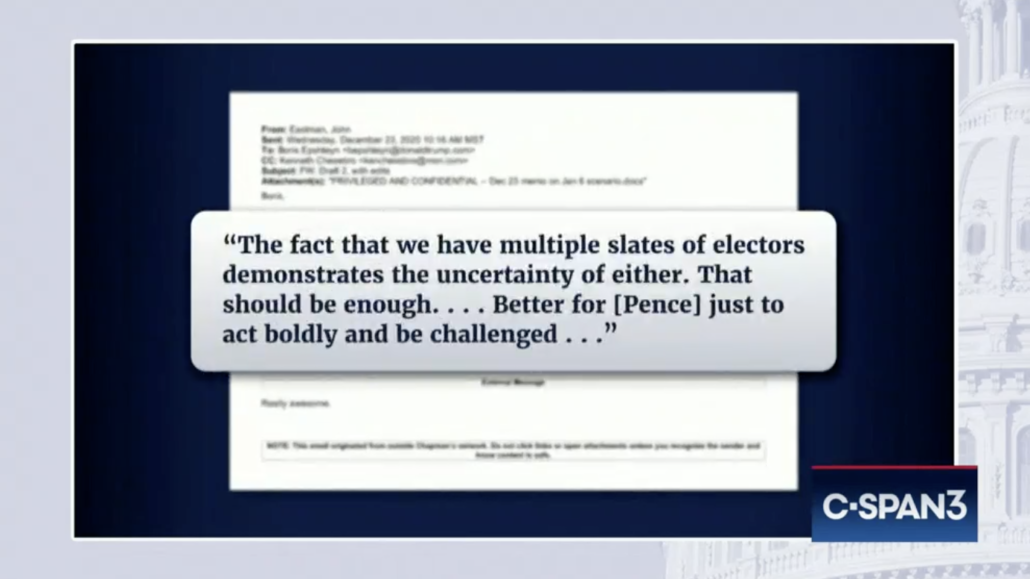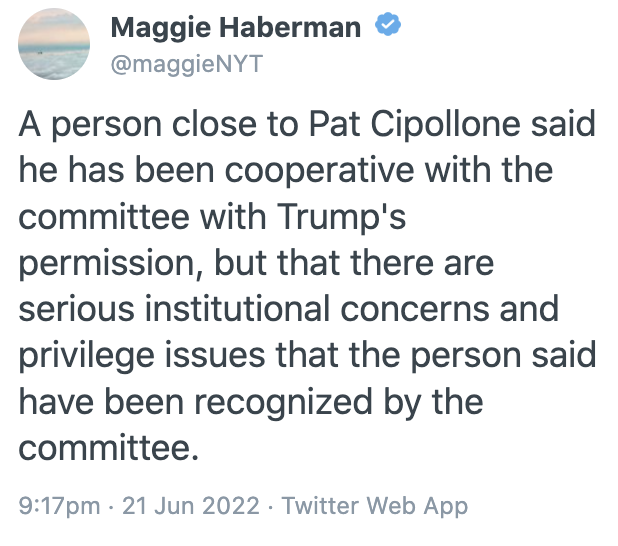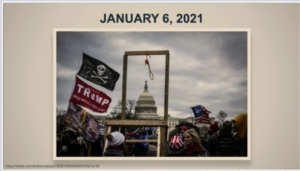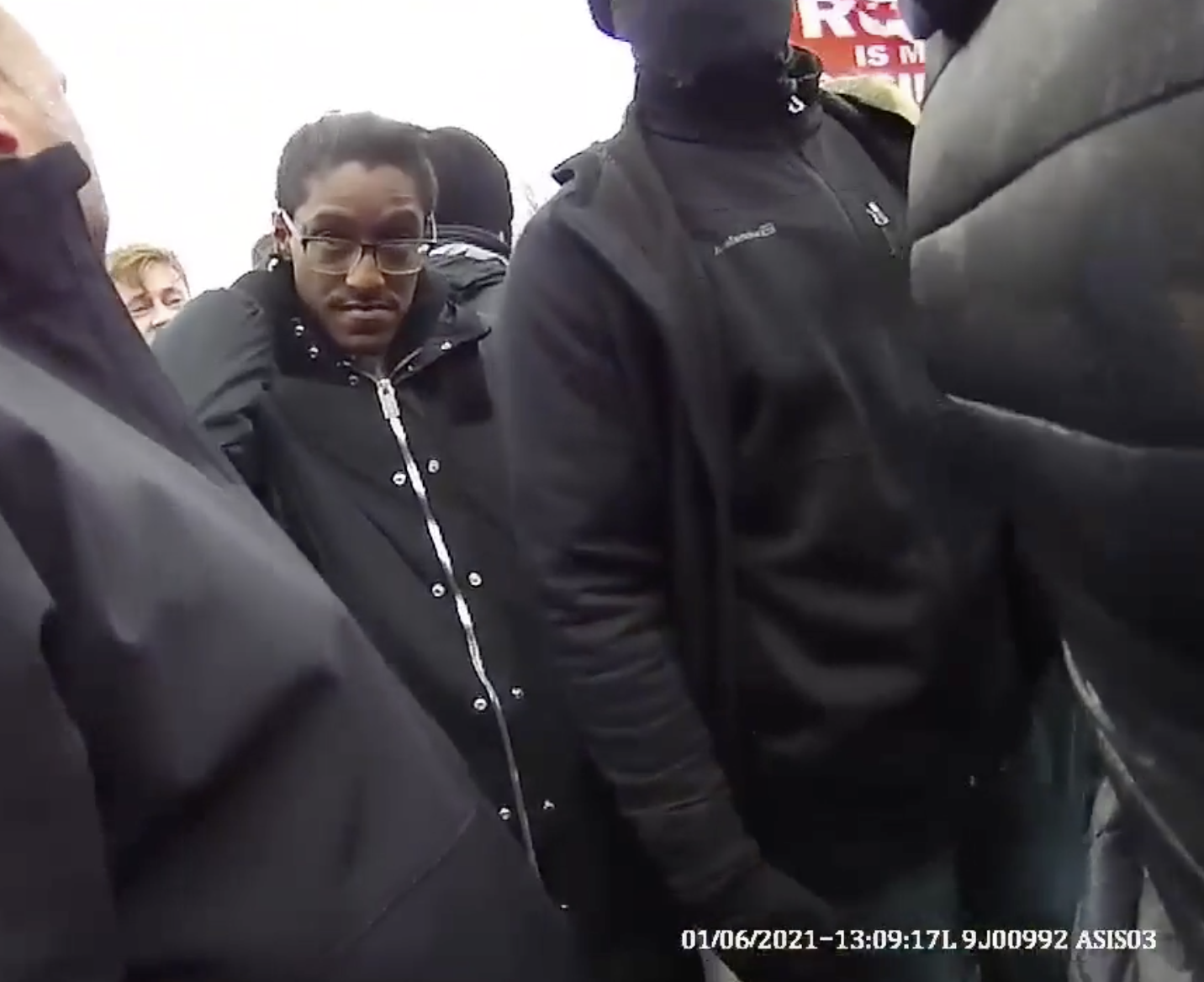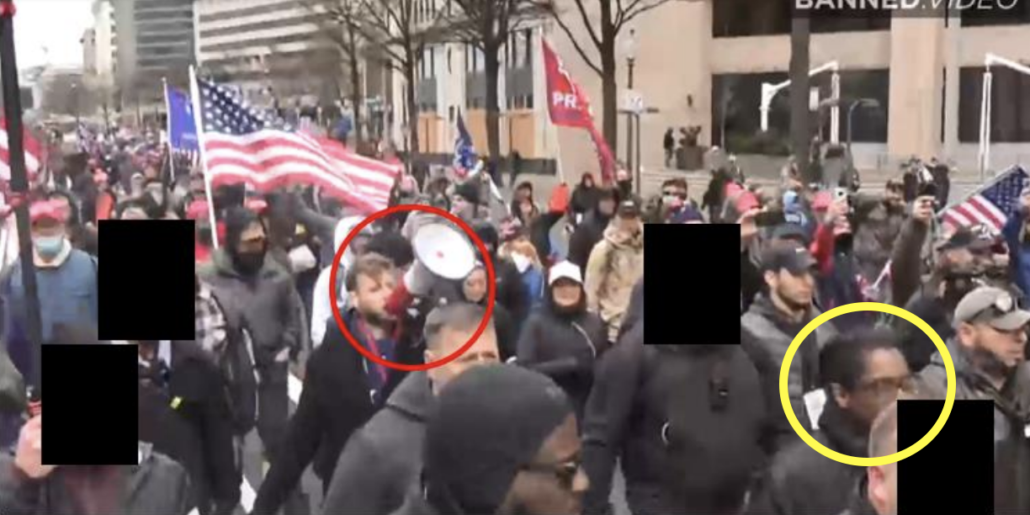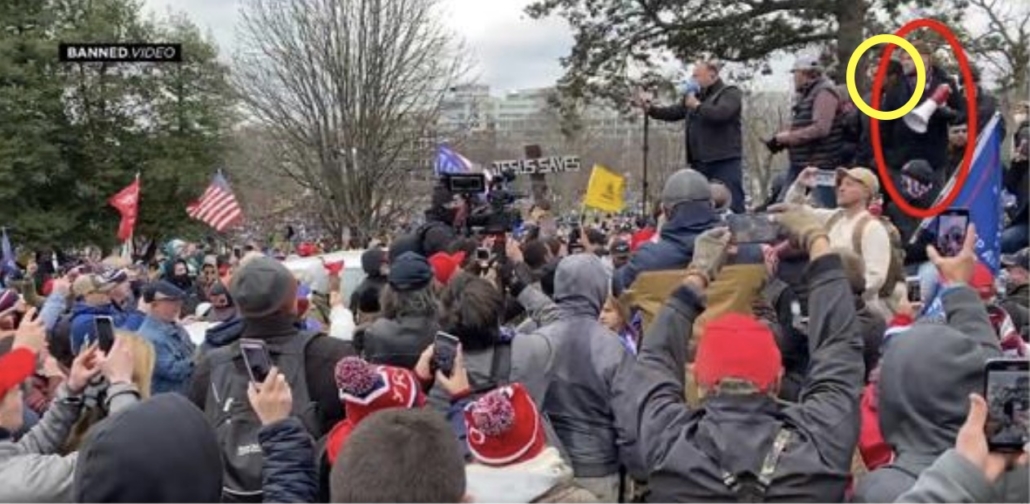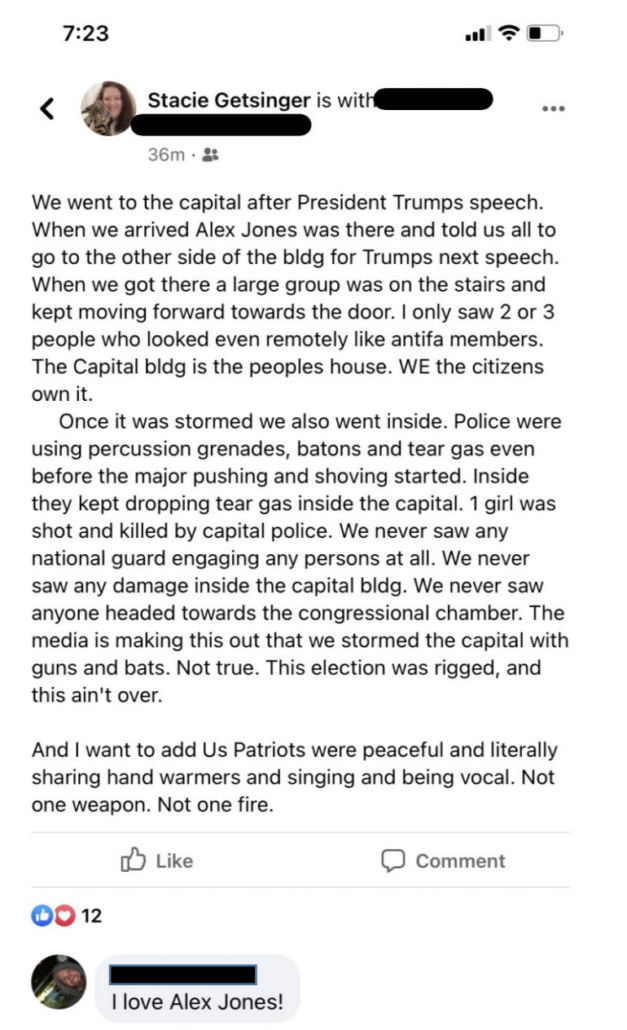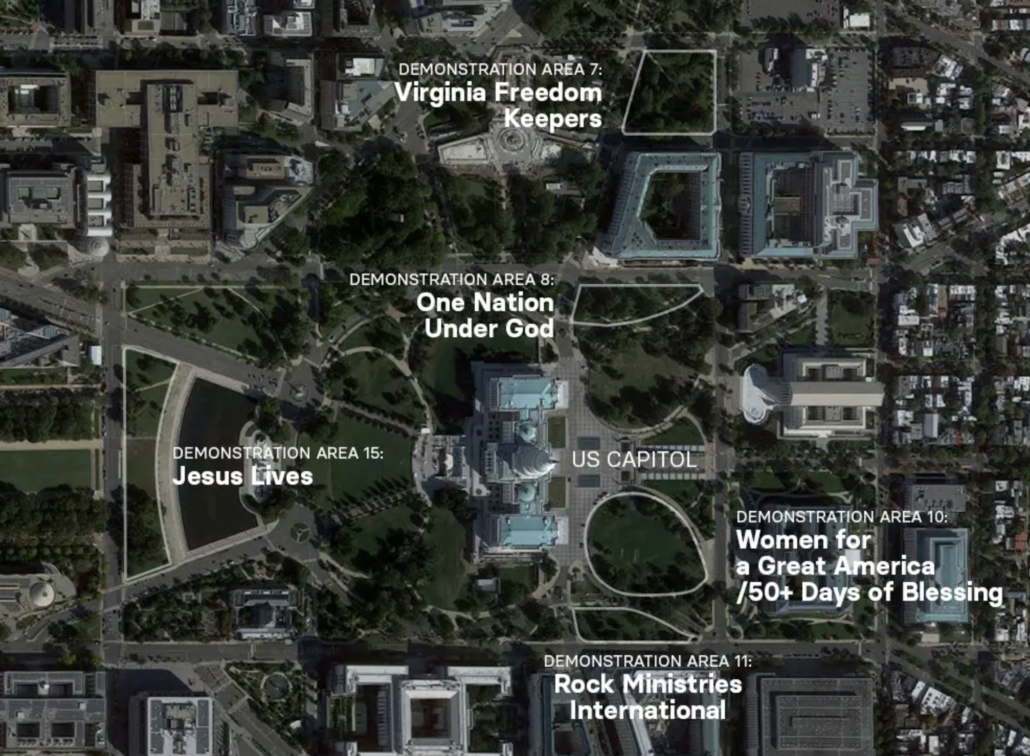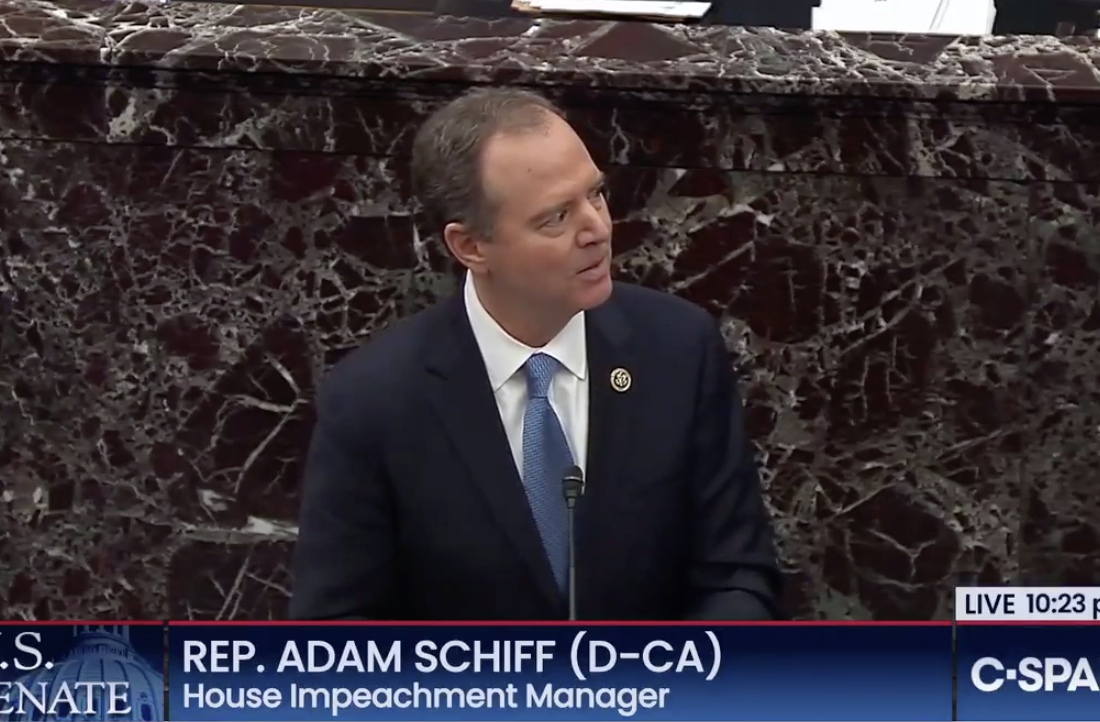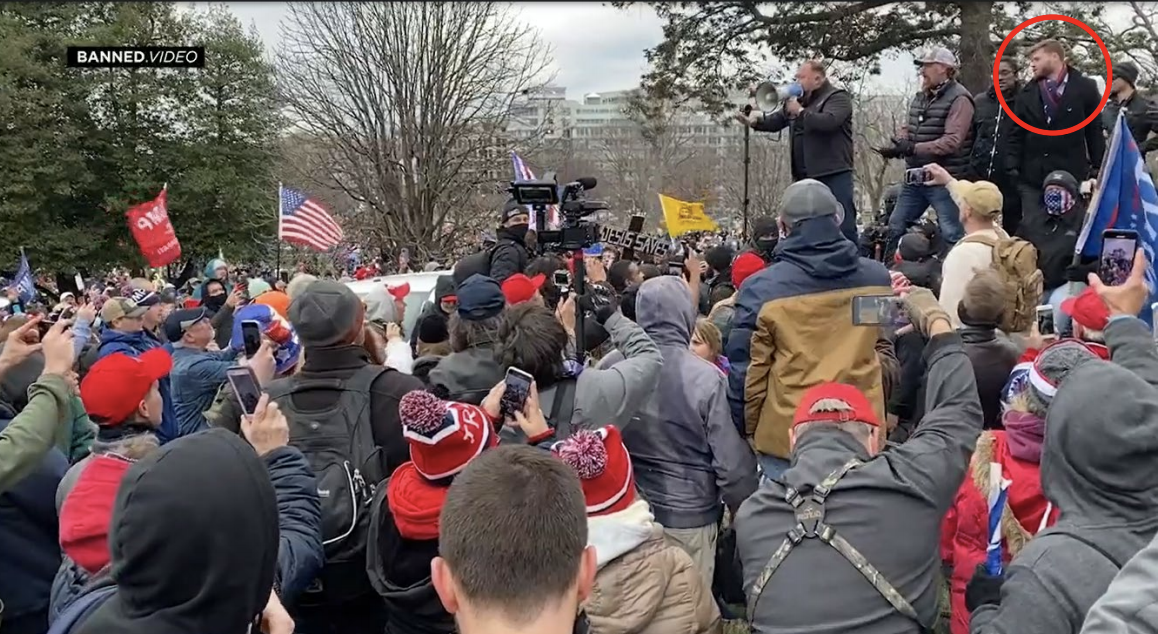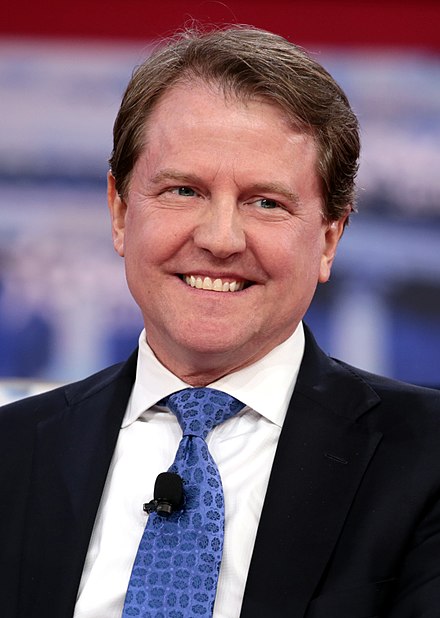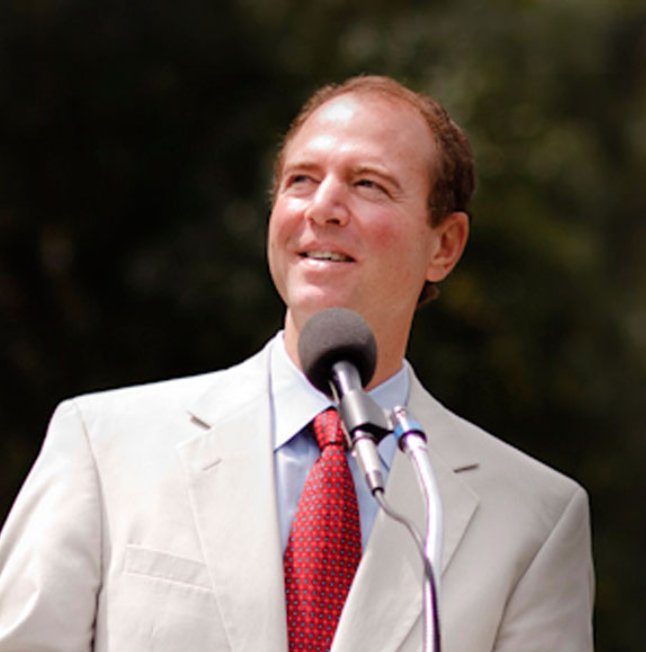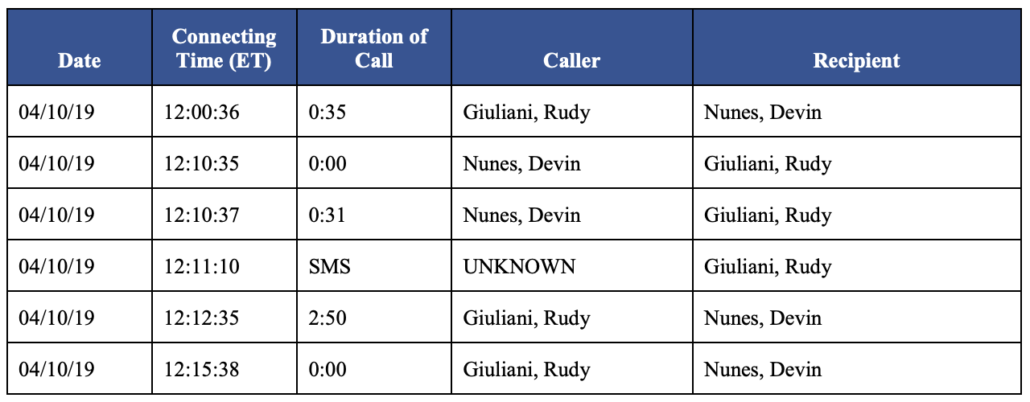Rudy Giuliani Launched a Lynch Mob over a Ginger Mint
I find it harder to describe the details of yesterday’s January 6 Committee hearing, covering pressure Trump put on states to alter the vote, than the earlier hearings. That’s because the testimony about Trump’s bullying of those who upheld democracy — particularly election worker Shaye Moss and Arizona Speaker of the House Rusty Bowers — elicited so much emotion. This is what Trump has turned great swaths of the Republican Party into: bullies attacking those who defend democracy.
Trump’s bullies attacking anyone defending democracy
Bowers described how a mob, including an armed man wearing a 3%er militia patch, came to his house as his daughter fought a terminal illness.
Moss described how a mob descended on her granny’s house, hunting for her and her mother, Ruby Freeman. At least one member of the mob targeting those two Black women who chose to work elections betrayed self-awareness off their regressive stance: Moss testified that one of the threats targeted at her said, “Be glad it’s 2020 and not 1920.”
And Adam Schiff got Moss to explain a detail that formed the core of a video Rudy Giuliani used to summon his mob. Rudy had claimed that when Ms. Freeman passed Shaye something, it was a thumb drive to replace votes.
It was actually a ginger mint.
Schiff: In one of the videos we just watched, Mr. Giuliani accused you and your mother of passing some sort of USB drive to each other. What was your mom actually handing you on that video?
Moss: A ginger mint.
Moss testified that none of the people who had been working with her full time on elections in Fulton County, Georgia are still doing that work. They’ve all been bullied out of working to uphold democracy.
Tying the state violence to the January 6 violence
Early in the hearing, Schiff tied these threats of violence to Stop the Steal, the organization behind the purported speakers that formed the excuse to bring mobs to the January 6 attack. He explained, “As we will show, the President’s supporters heard the former President’s claims of fraud and the false allegations he made against state and local officials as a call to action.” Shortly thereafter, investigative counsel Josh Roselman showed a video from Ali Alexander predicting at a protest in November 2020, “we’ll light the whole shit on fire.”
Much later in the hearing, Schiff tied the takeover of state capitals to the January 6 riot with a picture of Jacob Chansley invading Capitols in both AZ and DC.
Chansley already pled guilty to attempting to obstruct the vote certification, and one of the overt acts he took was to leave Mike Pence this threatening note on the dais.
So one thing the hearing yesterday did was to tie the threats of violence in the states to the expressions of violence on January 6.
Showing obstruction of the vote certification, including documents
A second video described the fake electors scheme, developing several pieces of evidence that may help DOJ tie all this together in conspiracy charges.
The video included testimony from Ronna McDaniel acknowledging the RNC’s involvement. (Remember that McDaniel joined in the effort to censure Liz Cheney when she learned the committee had subpoenaed Kathy Berden, the lead Michigander on that fake certificate; Berden has close ties to McDaniel.)
Essentially he turned the call over to Mr. Eastman who then proceeded to talk about the importance of the RNC helping the campaign gather these contingent electors in case any of the legal challenges that were ongoing changed the result of any of the states. I think more just helping them reach out and assemble them. But the — my understanding is the campaign did take the lead and we just were … helping them in that role.
The video also cited Trump’s own campaign lawyers (including Justin Clark, who represented Trump in conjunction with Steve Bannon’s refusal to testify) describing that they didn’t believe the fake electors scheme was prudent if the campaign no longer had legal challenges in a given state.
In a videotaped deposition, former campaign staffer Robert Sinners described himself and other workers as, “useful idiots or rubes at that point.” When ask how he felt upon learning that Clark and Matt Morgan and other lawyers had concerns about the fake electors, Sinners explained, “I’m angry because I think in a sense, no one really cared if … if people were potentially putting themselves in jeopardy.” He went on, “I absolutely would not have” continued to participate, “had I known that the three main lawyers for the campaign that I’ve spoken to in the past and leading up were not on board.”
And electors in individual states claimed to have been duped into participating, too. Wisconsin Republican Party Chair Andrew Hitt described that, “I was told that these would only count if a court ruled in our favor.” So using them as an excuse to make challenges on January 6, “would have been using our electors, well, it would have been using our electors in ways that we weren’t told about and we wouldn’t have supported.”
In the wake of yesterday’s hearing, one of MI’s fake electors, Michele Lundgren, texted reporters to claim that they had not been permitted to read the first page of the form they signed, which made the false claims.
As the video showed the fake certificates next to the real ones, Investigative Counsel Casey Lucier explained that,
At the request of the Trump campaign, the electors from these battleground states signed documents falsely asserting that they were the duly elected electors from their state, and submitted them to the National Archives and to Vice President Pence in his capacity as President of the Senate.
[snip]
But these ballots had no legal effect. In an email produced to the Select Committee, Dr. Eastman told a Trump campaign representative [Boris Epshteyn] that it did not matter that the electors had not been approved by a state authority. Quote, the fact that we have multiple slates of electors demonstrates the uncertainty of either. That should be enough. He urged that Pence act boldly and be challenged.
Documents produced to the Select Committee show that the Trump campaign took steps to ensure that the physical copies of the fake electors’ electoral votes from two states were delivered to Washington for January 6. Text messages exchanged between Republican Party officials in Wisconsin show that on January 4, the Trump campaign asked for someone to fly their fake electors documents to Washington.
A staffer for Wisconsin Senator Ron Johnson texted a staffer for Vice President Pence just minutes before the beginning of the Joint Session. This staffer stated that Senator Johnson wished to hand deliver to the Vice President the fake electors votes from Michigan and Wisconsin. The Vice President’s aide unambiguously instructed them not to deliver the fake votes to the Vice President.
Lucier made it clear, though, that these fake electors were delivered to both Congress (Johnson) and the Executive Branch (the Archives).
This video lays out critical steps in a conspiracy to obstruct the vote certification, one that — because it involves a corrupt act with respect to fraudulent documents — would even meet Judge Carl Nichols’ standard for obstruction under 18 USC 1512(c)(2).
The Court therefore concludes that § 1512(c)(2) must be interpreted as limited by subsection (c)(1), and thus requires that the defendant have taken some action with respect to a document, record, or other object in order to corruptly obstruct, impede or influence an official proceeding.
Understand, many of these people are awful and complicit (and bmaz will surely be by shortly to talk about what an asshole Rusty Bowers is). But with respect to the fake electors scheme, the Committee has teed up a parade of witnesses who recognize their own criminal exposure, and who are, as a result, already rushing to blame Trump for all of it. We know DOJ has been subpoenaing them for evidence about the lawyers involved — not just Rudy and Eastman, but also Justin Clark.
DOJ has also been asking about Boris Epshteyn. He showed up as the recipient of an email from Eastman explaining that it didn’t matter that the electors had no legal legitimacy.
As Kyle Cheney noted, the Committee released that email last month, albeit with Epshteyn’s name redacted.
The Republican Party has not just an incentive, but a existential need at this point, to blame Trump’s people for all of this, and it may do wonders not just for obtaining cooperative and cooperating witnesses, but also to change how Republicans view the January 6 investigation.
Exposing Pat Cipollone’s exceptional unwillingness to testify
Liz Cheney continued to use the hearings to shame those who aren’t cooperating with the Committee. In her opening statement, she played the video of Gabriel Sterling warning of violence, where he said, “All of you who have not said a damn word [about the threats and false claims] are complicit in this.”
Then after Schiff talked about the threat to democracy in his closing statement …
We have been blessed beyond measure to live in the world’s greatest democracy. That is a legacy to be proud of and to cherish. But it is not one to be taken for granted. That we have lived in a democracy for more than 200 years does not mean we shall do so tomorrow. We must reject violence. We must embrace our Constitution with the reverence it deserves, take our oath of office and duties as citizens seriously, informed by the knowledge of right and wrong and armed with no more than the power of our ideas and the truth, carry on this venerable experiment in self-governance.
Cheney focused on the important part played by witnesses who did what they needed to guard the Constitution, twice invoking God.
We’ve been reminded that we’re a nation of laws and we’ve been reminded by you and by Speaker Bowers and Secretary of State Raffensperger, Mr. Sterling, that our institutions don’t defend themselves. Individuals do that. And we’ve [been] reminded that it takes public servants. It takes people who have made a commitment to our system to defend our system. We have also been reminded what it means to take an oath, under God, to the Constitution. What it means to defend the Constitution. And we were reminded by Speaker Bowers that our Constitution is indeed a divinely inspired document.
That set up a marked contrast with the list of scofflaws who’ve obstructed the Committee.
To date more than 30 witnesses called before this Committee have not done what you’ve done but have invoked their Fifth Amendment rights against self-incrimination. Roger Stone took the Fifth. General Michael Flynn took the Fifth. John Eastman took the Fifth. Others like Steve Bannon and Peter Navarro simply refused to comply with lawful subpoenas. And they have been indicted. Mark Meadows has hidden behind President Trump’s claims of Executive Privilege and immunity from subpoena. We’re engaged now in litigation with Mr. Meadows.
Having set up that contrast, Congresswoman Cheney then spent the entire rest of her closing statement shaming Pat Cipollone for refusing thus far to testify.
The American people in our hearings have heard from Bill Barr, Jeff Rosen, Richard Donoghue, and many others who stood up and did what is right. And they will hear more of that testimony soon.
But the American people have not yet heard from Mr. Trump’s former White House counsel, Pat Cipollone. Our Committee is certain that Donald Trump does not want Mr. Cipollone to testify here. Indeed, our evidence shows that Mr. Cipollone and his office tried to do what was right. They tried to stop a number of President Trump’s plans for January 6.
Today and in our coming hearings, you will hear testimony from other Trump White House staff explaining what Mr. Cipollone said and did, including on January 6.
But we think the American people deserve to hear from Mr. Cipollone personally. He should appear before this Committee. And we are working to secure his testimony.
In the wake of this, someone “close to Cipollone” ran to Maggie Haberman and sold her a bullshit story, which she dutifully parroted uncritically.
Cheney had just laid out that the “institutional concerns” had been waived by other lawyers (and were, legally, in the case of Bill Clinton). And any privilege issue went out the window when Sean Hannity learned of the White House Counsel complaints. Plus, White House Counsel lawyer Eric Herschmann has testified at length, including about matters — such as the call Trump made to Vice President Pence shortly before the riot — involving Trump personally.
Given Cheney’s invocation of those who pled the Fifth, I wonder she suspects that Cipollone’s reluctance has less to do with his claimed excuses, and more to do with a concern that he has personal exposure.
He may! After all, he presided over Trump’s use of pardons to pay off several key players in the insurrection, including three of the people Cheney invoked to set up this contrast: Flynn, Stone, and Bannon (though I suspect Cipollone had checked out before the last of them). And these pardons — and the role of pardons in the planning for January 6 more broadly — may expose those involved, potentially including Cipollone, in the conspiracy.
Whether or not Cheney shames Cipollone into testifying, including with her appeal to religion, he may not have the same luxury of refusing when DOJ comes calling.

